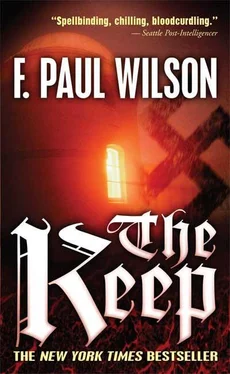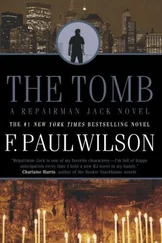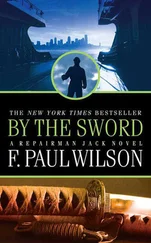F. Paul Wilson - The Keep
Здесь есть возможность читать онлайн «F. Paul Wilson - The Keep» весь текст электронной книги совершенно бесплатно (целиком полную версию без сокращений). В некоторых случаях можно слушать аудио, скачать через торрент в формате fb2 и присутствует краткое содержание. Жанр: Ужасы и Мистика, на английском языке. Описание произведения, (предисловие) а так же отзывы посетителей доступны на портале библиотеки ЛибКат.
- Название:The Keep
- Автор:
- Жанр:
- Год:неизвестен
- ISBN:нет данных
- Рейтинг книги:3 / 5. Голосов: 1
-
Избранное:Добавить в избранное
- Отзывы:
-
Ваша оценка:
- 60
- 1
- 2
- 3
- 4
- 5
The Keep: краткое содержание, описание и аннотация
Предлагаем к чтению аннотацию, описание, краткое содержание или предисловие (зависит от того, что написал сам автор книги «The Keep»). Если вы не нашли необходимую информацию о книге — напишите в комментариях, мы постараемся отыскать её.
The Keep — читать онлайн бесплатно полную книгу (весь текст) целиком
Ниже представлен текст книги, разбитый по страницам. Система сохранения места последней прочитанной страницы, позволяет с удобством читать онлайн бесплатно книгу «The Keep», без необходимости каждый раз заново искать на чём Вы остановились. Поставьте закладку, и сможете в любой момент перейти на страницу, на которой закончили чтение.
Интервал:
Закладка:
Appalled, Woermann found himself unable to reply as Kaempffer warmed to his subject.
"Do you know how many Jews there are in Romania, Klaus? Seven hundred and fifty thousand at last count. Perhaps a million! No one knows for sure, but once I start an efficient record system, we'll know exactly. But that's not the worst of it—the country is absolutely crawling with Gypsies and Freemasons. And worse yet: Muslims! Two million undesirables in all!"
"If only I had known!" Woermann said, rolling his eyes and pressing his hands against the side of his face. "I never would have set foot in this sinkhole of a country!"
Kaempffer heard him this time. "Laugh if you wish, Klaus, but Ploiesti will be most important. Right now we are transferring Jews all the way from Hungary to Auschwitz at a great waste of time, manpower, and fuel. Once Camp Ploiesti is functioning, I foresee many of them being shipped to Romania. And as commandant, I shall become one of the most important men in the SS ... in the Third Reich! Then it shall be my turn to laugh."
Woermann remained silent. He had not laughed ... he found the whole idea sickening. Facetiousness was his only defense against a world coming under the control of madmen, against the realization that he was an officer in the army that was enabling them to achieve that control. He watched Kaempffer begin to coil back and forth about the room again.
"I didn't know you were a painter," the major said, stopping before the easel as if seeing it for the first time. He studied it a moment in silence. "Perhaps if you had spent as much time ferreting out the killer as you obviously have on this morbid little painting, some of your men might—"
"Morbid! There's nothing at all morbid about that painting!"
"The shadow of a corpse hanging from a noose—is that cheerful?"
Woermann was on his feet, approaching the canvas. "What are you talking about?"
Kaempffer pointed. "Right there... on the wall."
Woermann stared. At first he saw nothing. The shadows on the wall were the same mottled gray he had painted days ago. There was nothing that even faintly resembled ... no, wait. He caught his breath. To the left of the window in which the village sat gleaming in the sunrise ... a thin vertical line connecting to a larger dark shape below it. It could be seen as a hunched corpse hanging from a rope. He vaguely remembered painting the line and the shape, but in no way had he intended to add this gruesome touch to the work. He could not bear, however, to give Kaempffer the satisfaction of hearing him admit that he saw it, too.
"Morbidity, like beauty, is in the eye of the beholder."
But Kaempffer's mind was already moving elsewhere. "It's lucky for you the painting's finished, Klaus. After I've moved in, I'll be much too busy to allow you to come up here and fiddle with it. But you can resume after I'm on my way to Ploiesti."
Woermann had been waiting for this, and was ready for it. "You're not moving into my quarters."
"Correction: my quarters. You seem to forget that I outrank you, Captain."
Woermann sneered. "SS rank! Worthless! Worse than meaningless. My sergeant is four times the soldier you are! Four times the man, too!"
"Be careful, Captain. That Iron Cross you received in the last war will carry you only so far!"
Woermann felt something snap inside him. He pulled the black-enameled, silver-bordered Maltese cross from his tunic and held it out to Kaempffer. "You don't have one! And you never will! At least not a real one—one like this, without a nasty little swastika at its center!"
"Enough!"
"No, not enough! Your SS kills helpless civilians—women, children! I earned this medal Fighting men who were able to shoot back. And we both know," Woermann said, his voice dropping to a fierce whisper, "how much you dislike an enemy who shoots back!"
Kaempffer leaned forward until his nose was barely an inch from Woermann's. His blue eyes gleamed in the white fury of his face. "The Great War ... that is all past. This is the Great War— my war. The old war was your war, and it's dead and gone and forgotten!"
Woermann smiled, delighted that he had finally penetrated Kaempffer's loathsome hide. "Not forgotten. Never forgotten. Especially your bravery at Verdun!"
"I'm warning you," Kaempffer said. "I'll have you—" And then he closed his mouth with an audible snap.
For Woermann was moving forward. He had stomached all he could of this strutting thug who discussed the "liquidation" of millions of defenseless lives as matter-of-factly as he might discuss what he was going to have for dinner. Woermann made no overtly threatening gesture, yet Kaempffer took an involuntary step backward at his approach. Woermann merely walked past him and opened the door.
"Get out."
"You can't do this!"
"Out."
They stared at each other for a long time. For a moment he thought Kaempffer might actually challenge him. Woermann knew the major was in better condition and physically stronger—but only physically. Finally, Kaempffer's gaze wavered and he turned away. They both knew the truth about SS-Sturmbannführer Kaempffer. Without a word, he picked up his black greatcoat and stormed out of the room. Woermann closed the door quietly behind him.
He stood still for a moment. He had let Kaempffer get to him. His control used to be better. He walked over to the easel and stared at his canvas. The more he looked at the shadow he had painted on the wall, the more it looked like a hanging corpse. It gave him a queasy feeling and annoyed him as well. He had meant for the sunlit village to be the focus of the painting, but all he could see now was that damned shadow.
He tore himself away and returned to his desk, staring again at the photograph of Fritz. The more he saw of men like Kaempffer, the more he worried about Fritz. He hadn't worried this much when Kurt, the older boy, had been in combat in France last year. Kurt was nineteen, a corporal already. A man now.
But Fritz—they were doing things to Fritz, those Nazis. The boy had somehow been induced to join the local Jugendführer, the Hitler Youth. When Woermann had been home on his last leave, he had been hurt and dismayed to hear his son's fourteen-year-old mouth regurgitating that Aryan Master Race garbage, and speaking of "Der Führer" with an awed reverence that had once been reserved for God alone. The Nazis were stealing his son from him right under his nose, turning the boy into a snake like Kaempffer. And there did not seem to be a thing Woermann could do about it.
There didn't seem to be anything he could do about Kaempffer either. He had no control over the SS officer. If Kaempffer decided to shoot Romanian peasants, there was no way to stop him, other than to arrest him. And he could not do that. Kaempffer was here by authority of the High Command. To arrest him would be insubordination, an act of brazen defiance. His Prussian heritage rebelled at the thought. The army was his career, his home ... it had been good to him for a quarter century. To challenge it now...
Helpless. That was how he felt. It brought him back to a clearing outside Posnan, Poland, a year and a half ago, shortly after the fighting had ended. His men had been setting up bivouac when the sound of automatic gunfire came from over the next rise, about a mile away. He had gone to investigate. Einsatzkommandos were lining up Jews—men and women of all ages, children—and systematically slaughtering them with fusillades of bullets. After the bodies had been rolled into the ditch behind them, more were lined up and shot. The ground had turned muddy with blood and the air had been full of the reek of cordite and the cries of those who were still alive and in agony, and to whom no one would bother to administer a coup de grâce.
Читать дальшеИнтервал:
Закладка:
Похожие книги на «The Keep»
Представляем Вашему вниманию похожие книги на «The Keep» списком для выбора. Мы отобрали схожую по названию и смыслу литературу в надежде предоставить читателям больше вариантов отыскать новые, интересные, ещё непрочитанные произведения.
Обсуждение, отзывы о книге «The Keep» и просто собственные мнения читателей. Оставьте ваши комментарии, напишите, что Вы думаете о произведении, его смысле или главных героях. Укажите что конкретно понравилось, а что нет, и почему Вы так считаете.












